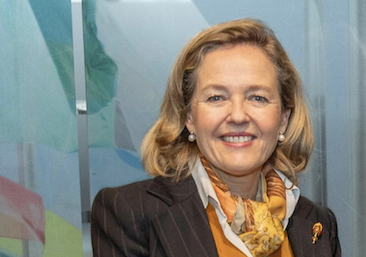European Investment Bank (EIB) Group President Nadia Calviño has announced a €3 billion financing package for agriculture, forestry and fisheries across Europe, along with moves to bolster farm insurance.
The EIB Group said its loans will be matched by other participating financial institutions, unlocking close to €8.4 billion of long-term investments for the bioeconomy sector.
“The support marks the largest EIB-backed financing initiative for European agriculture and will be directed towards small and medium-sized enterprises (SMEs) as well as mid-caps,” said the EIB.
“It will be spread over the next three years, with the first loans due to be signed in the first half of 2025.
“A share of the loans will be earmarked for young or new farmers because they generally have more trouble obtaining traditional bank financing.
“The support will also target female farmers to overcome a gender imbalance in agriculture as well as green investments to support the European Union’s sustainability goals.”
Calviño said: “Farming is a vibrant part of European life, and a productive part of our economy and security. The EIB Group financing announced today will help ensure a future for a new generation of farmers and companies active in the agri-food industry and the bioeconomy value chain.”
Commissioner for Agriculture and Food, Christophe Hansen, said: “I welcome the strong commitment of EIB in favour of the EU farming community, especially for young farmers and women farmers.
“Bridging the financing gap in the sector is vital, and with the EIB Group’s support we are giving agriculture the tools to thrive and grow. We will closely work with the EIB to make sure that this financing opportunity is taken up on the ground and delivers results. Together, we are securing a sustainable future for the sector.”
The new financing aims to spur investments in a range of activities including soil health, digital tools, water management and climate resilience. It is also intended to bolster training in sustainable farming practices and the purchase of land by young or new farmers, helping boost the 12% share of Europe’s farmers who are under the age of 40 and the 31.6% share who are women.
“We are stepping up our support for agriculture and the bioeconomy using a wide array of innovative tools,” said EIB Vice-President Gelsomina Vigliotti. “Working with partners along the whole value chain, we aim to help meet agriculture’s triple challenge of producing affordable food, protecting farm production and livelihoods in the face of climate change and preserving the environment and natural resources.”
To ensure favourable loan terms, the package allows for the financing to be complemented by interest rate subsidies or capital grants under the EU and national budgets.
“As part of its increased support for the bioeconomy, the EIB Group is exploring ways to improve agricultural insurance against the more frequent incidents of extreme weather including floods and droughts,” said the EIB.
“It will work with the European Commission, the insurance industry and other stakeholders to examine options for enhancing EU level support of current insurance schemes coupled with pan-European measures to accelerate investment in climate adaptation or to provide more liquidity and credit risk coverage for companies affected by climate disasters.”
The EIB Group said the action plan also includes:
- A venture debt programme, which will provide loans to innovative companies along the agricultural value chain working on, for example, new technologies, the development of payment for ecosystem services or sustainable biofuel and biomaterial technologies.
- Guarantee schemes possibly leveraging the European agricultural fund for rural development (EAFRD) and/or national resources under the Common Agricultural Policy Strategic Plans
- A private equity programme to back European fund managers that target European innovative technologies and solutions for the future of food (agritech, foodtech), and to attract private investors to the sector.
- A broadened scope of direct lending to medium-sized and large counterparts to include not only cooperatives but also other farmer organisations or entities such as irrigation communities, associations for dam and dike maintenance or forestry maintenance.
- Increased support to infrastructure in rural areas, such as road networks, education, and agricultural water management.
